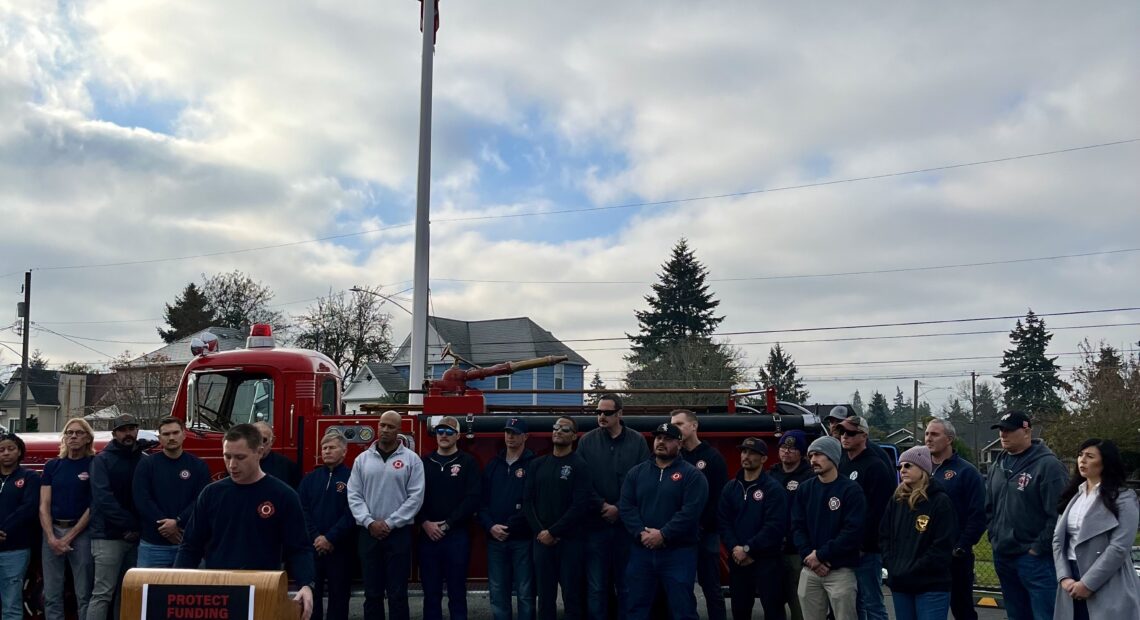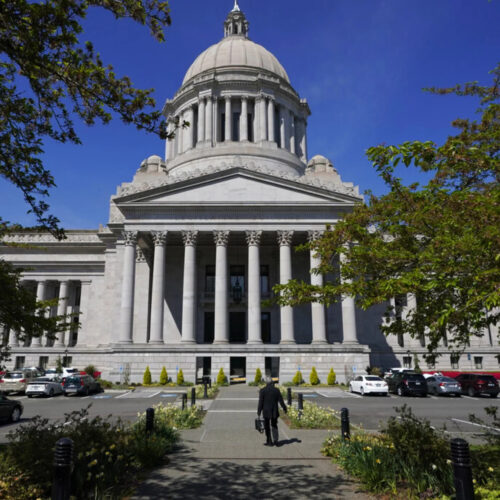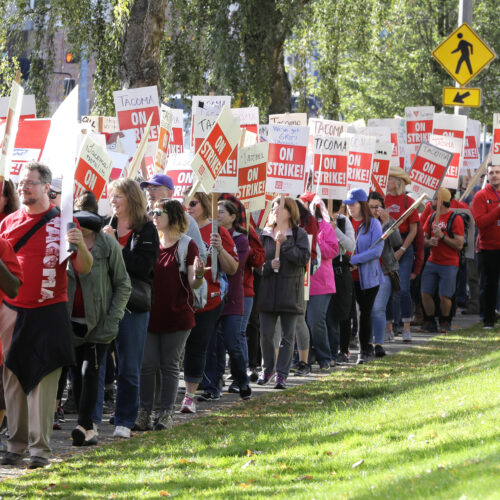
Tacoma City Council will direct city manager to make layoffs to balance budget
Council did not approve motion to fund fire ‘rover’ positions, there will not be any fire department layoffs
Listen
(Runtime 1:04)
Read
As the city of Tacoma works to manage its $24 million budget deficit, council members have been making decisions on what to cut. At Tuesday’s council meeting, the electeds considered two amendments.
The first amendment was brought forward by Council member Jamika Scott, who worked in collaboration with Council member Joe Bushnell to find a way to protect the city’s cash reserve. The initial proposed budget would have used the city’s over $8 million reserve to make up for the shortfall. That’s money the city can use to pay overtime costs for police and fire, fund shelter beds and other emergent costs.
“Taking the step now to decrease this gap will help us avoid having to make even deeper cuts later on,” Scott said.
The amendment directs the city manager to make a first round of cuts totaling $5.6 million to go toward the reserve. Those cuts will be to personnel and city programs and will result in over 25 city positions being cut. The amendment stipulates council will make decisions on the next round of cuts in the new year.
Layoff notifications will likely begin in January.
The council members that supported this amendment spoke about the uncertainty of funding leading them to feel a need to protect that reserve of city money. Council member Kiara Daniels spoke of the possibility that the city will have to shut down 300 shelter beds if the city cannot get grants or other funding totaling $9 million in the middle of the budget cycle.
“If we do not have that 8.9 million by (mid budget cycle) to be flexible, we won’t have an option of what to do at the end,” Daniels said.
Not all council members were satisfied with this amendment, as it still did not account for additional funding to the Tacoma Fire Department.
Firefighters, labor leaders and community members have spoken out against the city’s proposed budget, which takes $4 million from the department to go back to the general fund to try and offset the deficit. This money was a one-time influx from the EMS funds to staff 16 rover positions; firefighters that float to fill positions when other firefighters can’t work. The department has used this staffing model to reduce overtime, which is both costly and hazardous to firefighters, according to the International Association of Firefighters Local 31, the union that represents Tacoma firefighters.
While the proposed budget does not fund the 16 rover positions, no firefighters will lose their jobs. Instead, they will be reassigned to specific shifts.
Deputy Mayor John Hines brought forward a second amendment at Tuesday’s meeting in an attempt to fund that program and support the department.
“They’re running hundreds of calls more than they should and it puts a strain on everyone that’s involved,” Hines said. “I think that this program, if we support it, can both provide support to the fire department and our firefighters who are doing the work, and also it will provide support to our community who depend upon them and continue to call 911 for support.”
But, debate amongst council during the meeting bore out that if they were to pass both amendments, the city would have to make cuts totaling over $14 million, a number the majority of council did not feel comfortable moving forward with.
“Coming into today, this is the amendment I thought I was going to be supporting,” Council member Sandesh Sadalge said of the fire amendment. “At this point, I will not be voting for this, but that does not mean I don’t support looking at community safety as a whole.”
Tacoma firefighters started an online petition to urge the city council to fund the rover positions.
Firefighters are not only disappointed by the cutting of the rover positions, which they feel will impact service and response times in the city, but also with the continued lack of funding for other critical areas for the department, such as new equipment and facilities.
Response times in the city are already, on average, slower than industry standards. The Tacoma Fire Department’s Standards of Cover Study showed no stations met the goal of four minute travel time, with most on average taking over seven minutes.
At a press conference this week, Tacoma firefighter Ryan Pregent shared one experience where his crew was dispatched to a vehicle fire outside their coverage area because the other four closest units were tied up with other calls.
By the time they arrived on scene, the fire had spread to another vehicle. Then, the pump didn’t work. Pregent had to manually engage it to put the fire out.
“Seeing the look on faces of the people that we’re sworn to serve is demoralizing when we finally show up and our equipment won’t work or breaks down in the moment that they need it the most,” Pregent said.
Jared Faker is the president of the International Longshore and Warehouse Union Local 23, which represents over 2,000 workers in and around the Port of Tacoma. He said with the loss of the rover positions there could be “brownouts,” meaning stations could be out of service when staffing levels dip too low. That’s a concern for him and his workers, who rely on quick responses from Station 5.
“When there’s an accident or incident at the Port, the response times are a matter of life and death,” Faker said. “Going back to those days is unacceptable to workers in the Port of Tacoma.”
At the press conference, IAFF Local 31 President Allyson Hinzman again alluded to the department leaving the city and instead forming its own taxing district or regional fire authority, which would allow them to collect their own funding. She said the union is looking to have conversations with the city about this.
The department is working with the same number of people and apparatus as they were in 1955, according to Hinzman. Yet they are now serving both Fife and Fircrest, in addition to Tacoma and the Port. Three new fire engines ordered in 2023 will only replace existing older engines, not add new ones to the department.
UPDATE: This story has been updated with information about the Tacoma Fire Department’s travel times.
















